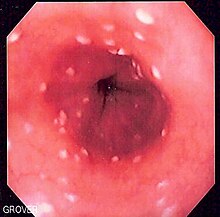| Esophageal candidiasis | |
|---|---|
 | |
| Endoscopic image of esophageal candidiasis in a patient after chemotherapy. Brushings confirmed the presence of hyphae | |
| Specialty | Infectious diseases |
Esophageal candidiasis is an opportunistic infection of the esophagus by Candida albicans. The disease usually occurs in patients in immunocompromised states, including post-chemotherapy and in AIDS. However, it can also occur in patients with no predisposing risk factors, and is more likely to be asymptomatic in those patients.[1] It is also known as candidal esophagitis or monilial esophagitis.
- ^ Mimidis, K; Papadopoulos, V; Margaritis, V; Thomopoulos, K; Gatopoulou, A; Nikolopoulou, V; Kartalis, G (February 2005). "Predisposing factors and clinical symptoms in HIV-negative patients with Candida oesophagitis: are they always present?". International Journal of Clinical Practice. 59 (2): 210–3. doi:10.1111/j.1742-1241.2004.00249.x. PMID 15854199. S2CID 8694312.